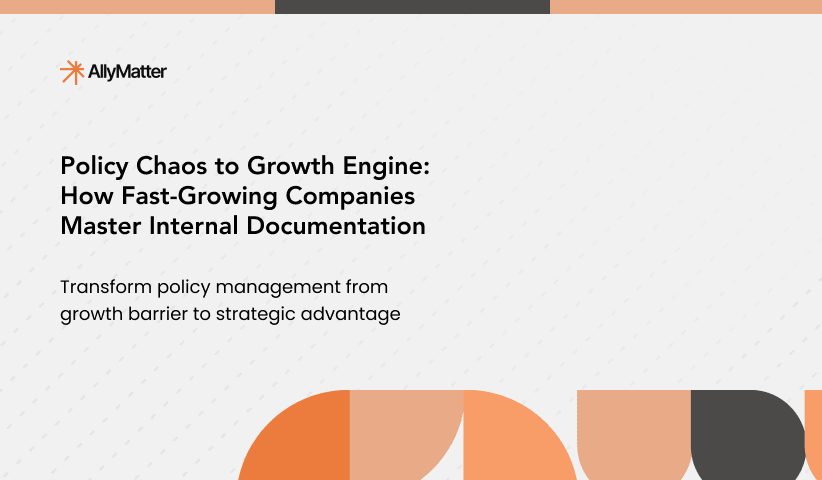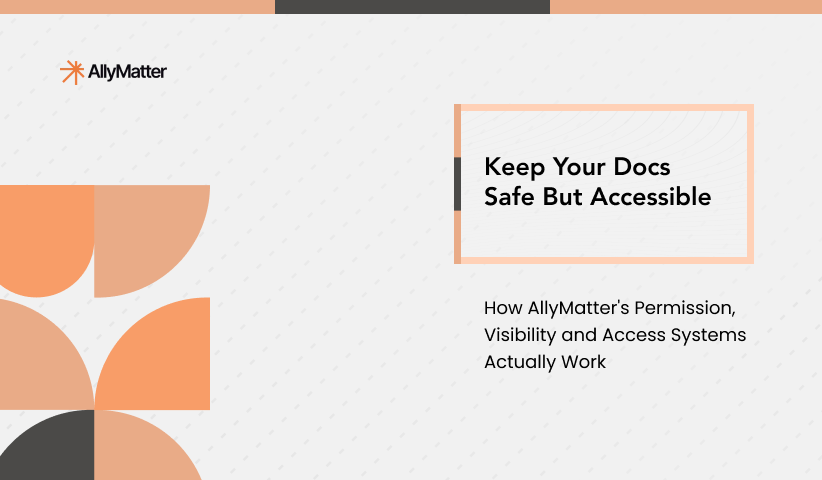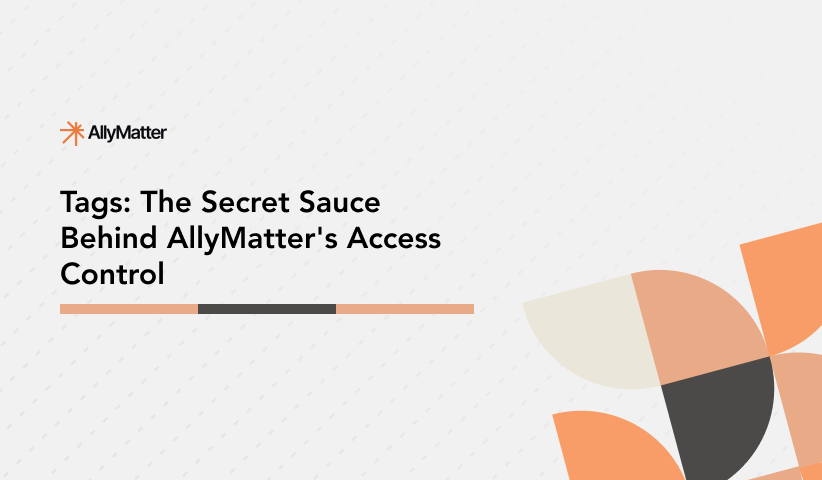Product teams operate under constant pressure to deliver. The focus on speed frequently undermines proper documentation of crucial product decisions, specifications, and processes.
When product knowledge lives in scattered tools, siloed departments, and individual team members’ minds, the result is predictable: inconsistent products, reinvented wheels, and lost institutional memory when key team members depart.
Let’s explore how a centralized knowledge management platform like AllyMatter transforms how product teams document, share, and leverage their collective knowledge.
1. Preserving design decisions and product thinking
“Why did we design this feature this way?” It’s a question that plagues product teams, especially when facing choices that seem settled long ago. When design decisions and rationales aren’t documented, teams waste precious time revisiting resolved questions or making inconsistent choices.
AllyMatter preserves your product thinking with searchable decision records that maintain context even as team members change. By documenting not just what was built but why it was built that way, you transform tribal knowledge into institutional memory that guides future product development.
Consider a product team designing a critical user flow. With AllyMatter, they document not just the final design but the research insights, alternative approaches considered, and business constraints that shaped their decisions, creating an invaluable resource for current and future team members.
2. Centralizing product requirements documentation
Sarah, a senior product manager, recently onboarded two new developers who spent their first week asking the same question repeatedly: ‘Where are the API specifications for the payment integration?’ Instead of productive coding time, both developers lost hours hunting through Slack conversations and outdated Google Docs. With centralized documentation, this common frustration disappears entirely.
When specifications scatter across Google Docs, Figma comments, Jira tickets, and Slack threads, developers waste hours hunting for critical details instead of writing code. AllyMatter centralizes all product requirements with version-controlled documentation accessible to your entire development organization.
Your product managers can create standardized requirement templates, ensuring consistent documentation across features. Developers gain immediate access to the latest specifications, reducing the constant back-and-forth that delays releases.
3. Maintaining consistent design standards
Products designed without clear documentation of standards and guidelines inevitably develop fragmented experiences over time. What starts as minor inconsistencies in button styles or interaction patterns eventually creates a disjointed product that confuses users and undermines trust.
AllyMatter helps maintain consistent quality through accessible design systems that ensure cohesive user experiences. Your design team can document component libraries, interaction patterns, and visual standards in one searchable repository that guides implementation across features and product lines.
For example, a product team might maintain living documentation of UI components with usage guidelines, ensuring that primary actions, navigation patterns, and form designs remain consistent as the product evolves and new designers join the team.
4. Accelerating product team onboarding
New hires on product teams typically spend weeks piecing together how your product works instead of contributing value. This lengthy learning curve isn’t just frustrating; it’s expensive. Research from the Society for Human Resource Management suggests that onboarding costs can reach up to $4,129 per employee, with a significant portion attributable to lost productivity during the learning period.
AllyMatter cuts product team onboarding time dramatically with comprehensive documentation organized for rapid knowledge transfer. New team members can follow guided learning paths through your product knowledge base, understanding not just how features work but why they were implemented.
A structured internal knowledge base means new product managers, designers, and developers become productive contributors much faster, with clear documentation of product history, roadmap, and technical architecture at their fingertips.
5. Preventing feature duplication
When existing components aren’t documented, developers waste time recreating solutions that already exist. This problem compounds in larger organizations where teams might work on similar features without awareness of each other’s efforts.
AllyMatter ensures development efficiency with searchable technical specifications that promote reuse and consistency. Your technical documentation becomes a living library of reusable components, APIs, and integration points that developers can discover and implement rather than recreate.
For instance, when a team needs to implement a new notification system, they can search AllyMatter to discover that another team has already built a configurable notification service, complete with documentation on how to integrate it.
6. Streamlining approval workflows for product documentation
Product documentation often requires review and approval from multiple stakeholders – product managers, legal teams, security experts, and technical leads. Manual approval processes create bottlenecks that delay releases and frustrate teams.
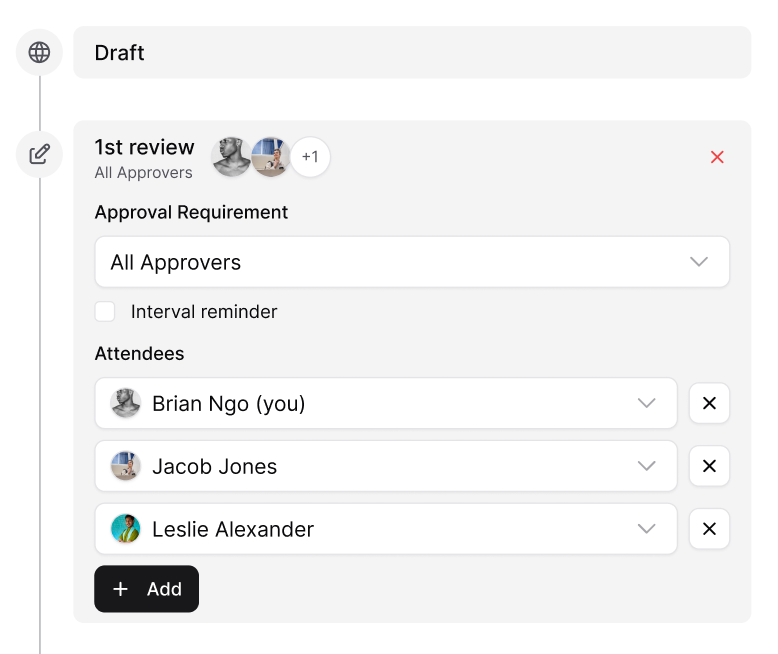
AllyMatter’s smart approval flows enable faster, transparent, and structured approvals for critical documents. You can define custom workflows based on document type, ensuring the right people review product specifications, technical documentation, or release notes at the right time.
With built-in signatures and complete audit trails, your team maintains accountability while dramatically reducing the time from documentation creation to approval and implementation.
7. Enhancing cross-functional collaboration on product initiatives
Successful product development requires seamless collaboration between product managers, designers, engineers, QA specialists, and many others. Without a shared documentation space, these functions often work from different information sources, leading to misalignment and implementation errors.
AllyMatter provides efficient collaboration tools with secure commentary and version control. Team members can contribute to living documents, tracking changes and discussions in context rather than across fragmented email threads or chat messages.
For example, when a product spec needs refinement, stakeholders can comment directly on specific sections, suggest changes, and resolve discussions; all while maintaining a clear record of decisions made and their rationale.
8. Ensuring regulatory compliance and documentation
Product teams in industries like healthcare, finance, and manufacturing face strict compliance requirements for documentation. Meeting these standards without overburdening the development process presents a significant challenge.
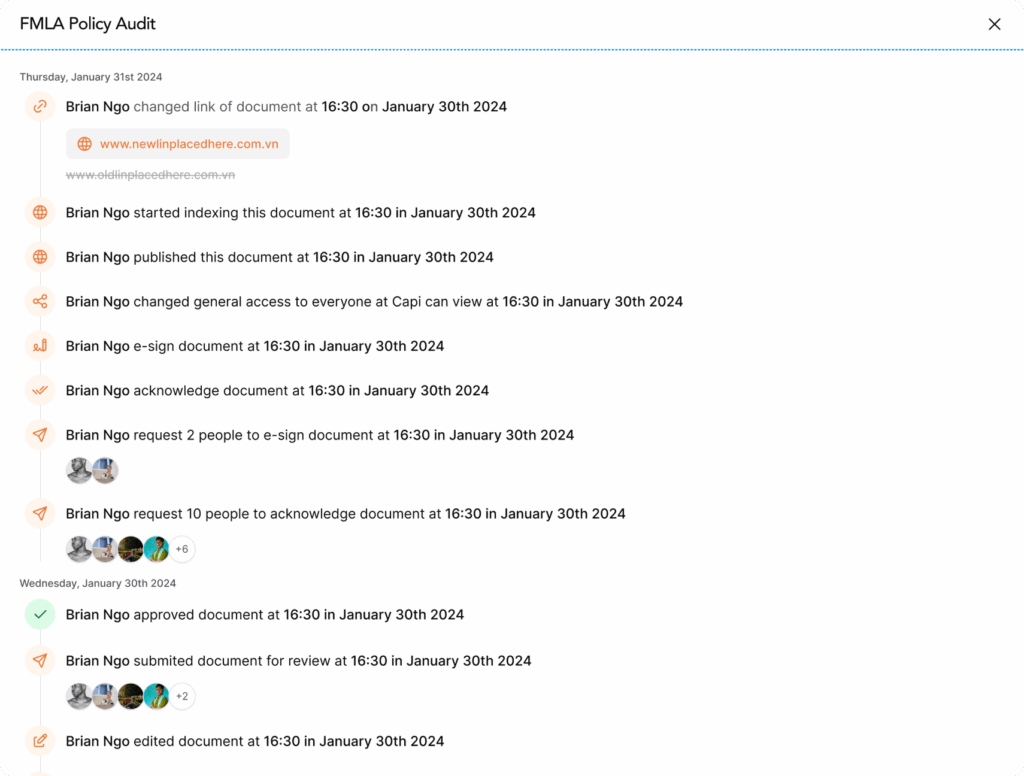
AllyMatter’s complete audit trail tracks every change for full accountability and effortless compliance. The platform’s legal acknowledgment features ensure team members formally recognize critical documentation, with flexible options from simple acknowledgment buttons to full third-party e-signature integration.
This rigorous yet streamlined approach to compliance documentation means your product team can maintain velocity while satisfying regulatory requirements, a critical advantage in highly regulated industries.
9. Optimizing knowledge transfer and institutional memory
As product organizations scale, they face an increasing risk of knowledge silos and gaps. When key team members leave, critical product knowledge often departs with them, forcing remaining team members to rediscover design rationales and implementation details.
AllyMatter transforms institutional memory into competitive advantage. By documenting feature rationales, user research insights, and strategic choices, your product team ensures development continuity regardless of team turnover.
This approach creates resilience against knowledge loss, giving your organization a strategic advantage over competitors who must repeatedly relearn what was once known but not documented.
10. Scaling product development processes
Maintaining documentation quality during growth phases challenges even the most disciplined organizations. As teams expand and product lines multiply, documentation processes that worked for small teams often break under increased complexity.
AllyMatter’s enterprise-grade user management and access controls ensure your documentation scales with your organization. Granular permissions mean team members see exactly what they need, while custom branding aligns your knowledge base with your company’s identity.
Growing product organizations can organize documentation by product line, team responsibility, or development phase, creating appropriate structures that grow naturally with the business.
Transforming product knowledge into innovation advantage
Well-documented product knowledge delivers its greatest value through enabling consistent innovation. When product decisions, technical implementations, and user research findings live in a searchable, accessible platform rather than scattered across tools or team members’ minds, your organization builds on past insights rather than repeatedly rediscovering them.
AllyMatter serves as the central nervous system for your product development organization – preserving insights, streamlining processes, and enabling the kind of institutional learning that separates market leaders from followers.
By documenting what works today, your product team creates the foundation for innovation tomorrow.
Key takeaways:
- Centralized product documentation dramatically reduces time wasted searching for information.
- Preserved design decisions and rationales prevent inconsistent product development.
- Structured onboarding accelerates new team member productivity.
- Documented components and implementations prevent costly duplication of effort.
- Smart approval workflows and access controls maintain quality while reducing friction.
- Comprehensive audit trails satisfy compliance requirements without slowing development.
Ready to eliminate product documentation chaos? Join our waitlist to be among the first to experience how AllyMatter transforms product team knowledge management.
Frequently asked questions
How does AllyMatter differ from traditional product documentation tools like Confluence or Notion?
Unlike general-purpose tools, AllyMatter is purpose-built for enterprise knowledge management with smart approval workflows, granular access controls, and complete audit trails. While Confluence and Notion require significant configuration and lack built-in compliance features, AllyMatter provides enterprise-grade security and structured workflows out of the box, specifically designed for regulated industries and growing organizations.
Can AllyMatter integrate with existing product development tools like Jira, Figma, or GitHub?
AllyMatter centralizes documentation while connecting to your existing workflow. Rather than forcing tool migrations, it serves as the single source of truth that references and organizes information from your current toolstack, ensuring product specifications, design decisions, and technical documentation remain accessible regardless of where they originated.
How long does it typically take to implement AllyMatter for a product team?
Implementation varies based on existing documentation volume and team size. Most product teams begin seeing value within the first week through structured onboarding paths and centralized access. Full organizational benefits, including preserved institutional knowledge and streamlined approval workflows, typically emerge within the first month as teams establish consistent documentation practices.
What happens to our existing product documentation when migrating to AllyMatter?
AllyMatter supports seamless migration of existing documentation with preserved version history and metadata. Our platform maintains document relationships and cross-references, ensuring no critical product knowledge is lost during transition. Teams can migrate incrementally, starting with high-priority documentation while gradually centralizing their complete knowledge base.
How does AllyMatter handle sensitive product information and intellectual property?
AllyMatter provides enterprise-grade encryption, granular access controls, and role-based permissions that ensure sensitive product information remains secure. Complete audit trails track every access and modification, while customizable approval workflows ensure only authorized team members can view or modify critical intellectual property and strategic product documentation.
